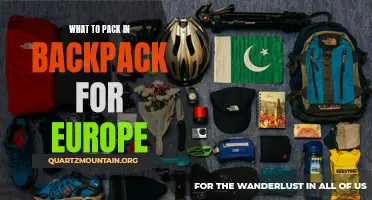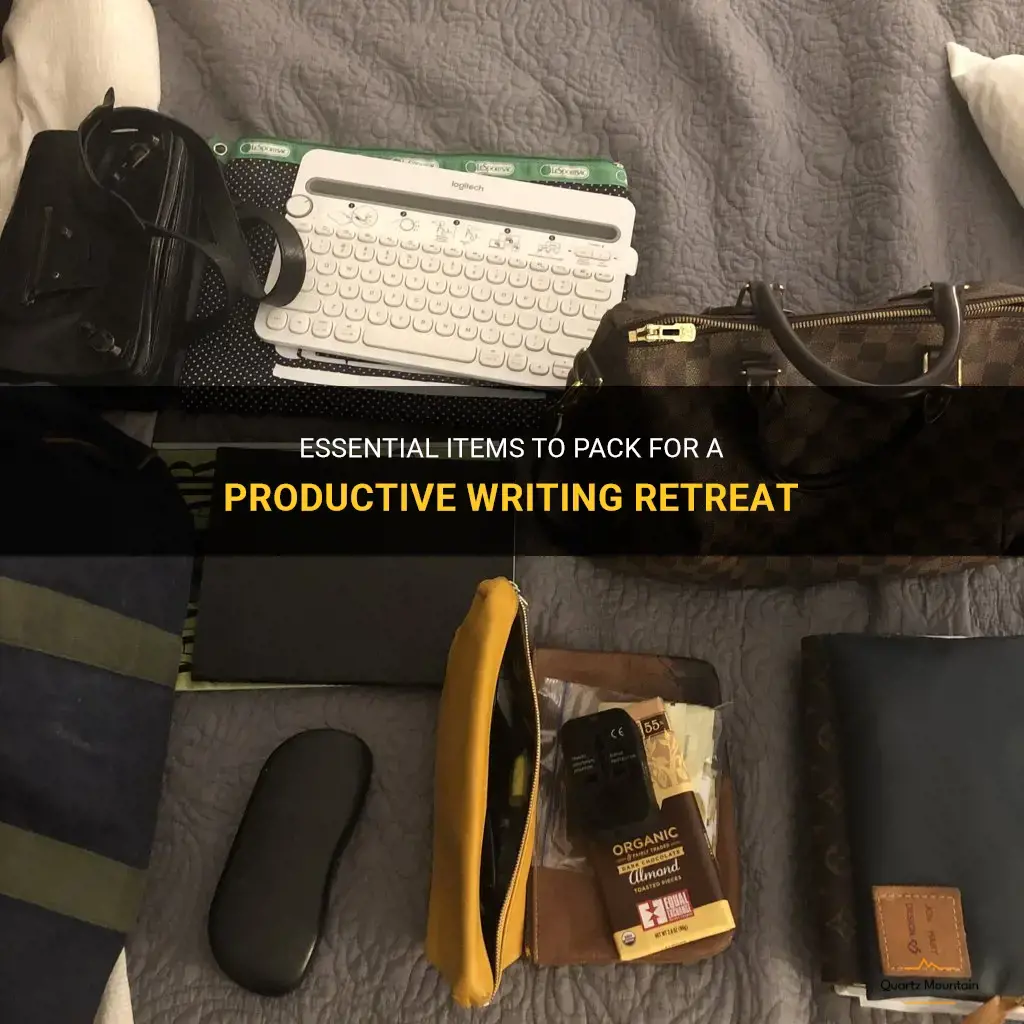
Are you planning a writing retreat and wondering what essential items to pack? Look no further! In this guide, we will discuss the must-have items to ensure a productive and successful writing retreat. From writing tools to soothing ambience, we have got you covered. So, sit back, relax, and get ready to make the most out of your writing escape with these essential items.
What You'll Learn
- What are the essential items to pack for a writing retreat?
- What type of clothing should I pack for a writing retreat?
- Are there any specific writing tools or supplies that I should bring?
- Should I bring snacks or other food items for the duration of the retreat?
- Are there any recommended books or reading materials to bring along for inspiration during a writing retreat?

What are the essential items to pack for a writing retreat?
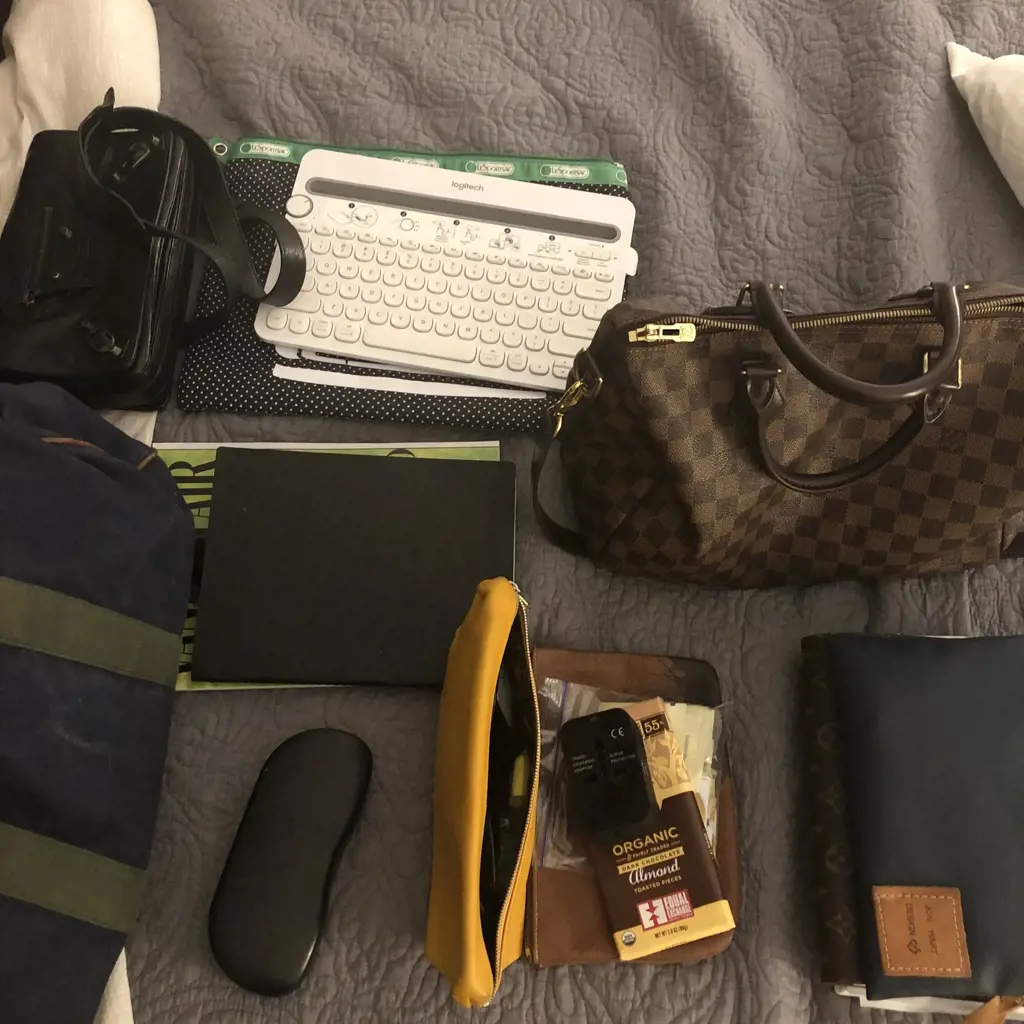
A writing retreat is a fantastic opportunity to focus on your writing goals and immerse yourself in a productive and inspiring environment. To make the most of your retreat, it's essential to pack the right items that will help you stay organized, motivated, and comfortable. Here are the essential items you should bring with you on a writing retreat:
- Writing tools: Of course, the most crucial items to pack for a writing retreat are your writing tools. Whether you prefer pen and paper or a laptop, ensure you have all the necessary equipment to start your writing sessions seamlessly. It's always a good idea to bring backups, such as extra pens or a spare charger for your laptop, to avoid any disruptions.
- Notebooks and paper: Even if you primarily write on a digital device, having a notebook or notepads on hand can be incredibly useful. Use them for brainstorming sessions, outlining, or jotting down any creative ideas that come to mind during your retreat. They can also serve as a backup if your digital device fails or runs out of battery.
- Research materials: If your writing requires any form of research, make sure to bring along any books, articles, or materials relevant to your project. Having these resources readily available will save you time and allow you to dive deep into your writing without interruptions.
- Comfortable clothing: A writing retreat is a time to focus on your work without worrying about your appearance. Pack comfortable clothing that allows you to move freely and feel at ease during long writing sessions. Consider the climate and location of your retreat and pack accordingly.
- Snacks and beverages: Fueling your creativity requires fueling your body. Bring along your favorite snacks and beverages to keep you energized throughout the day. Healthy snacks like nuts, fruits, and granola bars can provide a steady stream of energy, while coffee or tea can help you stay alert and focused.
- Writing prompts or exercises: Sometimes, writer's block can strike, even during a retreat. Prepare for these moments by bringing along writing prompts or exercises that can help jumpstart your creativity. These prompts can be in the form of books, cards, or even printed sheets. Having them on hand can turn a moment of frustration into a delightful writing challenge.
- Comfort items: It's important to create a comfortable and inspiring environment during your retreat. Consider bringing items that enhance the atmosphere, such as scented candles, your favorite mug for tea or coffee, a cozy blanket, or inspiring artwork. These comfort items can help set the mood and make your writing space more inviting and conducive to productivity.
- To-do lists and schedules: To stay organized and make the most of your retreat, bring along a detailed to-do list and a schedule. This will help you prioritize tasks and allocate specific time slots for writing, breaks, meals, and any other activities you want to incorporate. Having a clear plan will keep you on track and prevent you from feeling overwhelmed or aimless during your retreat.
- External storage devices: It's crucial to back up your writing regularly to avoid the potential loss of your work. Pack an external hard drive or reliable cloud storage solution to keep copies of your work in case of any technological mishaps. Regularly saving and backing up your files will give you peace of mind and ensure your retreat is a productive experience.
- Open mind and positive attitude: Lastly, don't forget to pack an open mind and a positive attitude. Writing retreats are fantastic opportunities for growth and self-reflection. Embrace the solitude, engage with fellow writers if you're attending a group retreat, and be open to new ideas and perspectives. Let go of any expectations and enjoy the journey of your writing retreat.
In conclusion, packing the right items for a writing retreat can make a significant difference in your productivity and overall experience. By bringing essential writing tools, research materials, comfort items, snacks, and a positive mindset, you'll create the ideal environment to focus on your writing goals and make the most of your retreat. Happy writing!
Tips for What to Do After Applying a Face Pack
You may want to see also

What type of clothing should I pack for a writing retreat?

As a writer, going on a retreat can be a great way to focus on your work and get some much-needed inspiration. But when it comes to packing for a writing retreat, one thing you might not think about is what type of clothing to bring. While it may seem like a small detail, the right clothing can actually make a big difference in your comfort and productivity during your retreat.
First and foremost, it's important to consider the weather and climate of the location where you'll be staying. If you're going to be in a warm, sunny location, you'll want to pack lightweight, breathable clothing that will keep you cool and protect you from the sun. This might include items like shorts, t-shirts, sundresses, and a wide-brimmed hat. On the other hand, if you'll be in a colder climate, you'll want to pack warmer layers such as sweaters, jackets, and long pants.
Next, consider the type of activities you'll be doing during your retreat. If you're planning on spending a lot of time outdoors, you'll want to bring clothing that is comfortable and appropriate for activities like hiking or walking. This might include items like athletic shoes, moisture-wicking socks, and pants that allow for easy movement. If, on the other hand, you'll be spending most of your time indoors in a cozy cabin, you'll want to pack comfortable loungewear like sweatpants and slippers.
It's also important to keep in mind the purpose of your retreat. If your main goal is to focus on your writing and minimize distractions, you'll want to pack clothing that is simple and doesn't require a lot of thought or effort. This might mean bringing several of the same basic items that you can easily mix and match, so you don't have to spend time worrying about what to wear each day. On the other hand, if your retreat has a more social aspect and you'll be spending time interacting with other writers, you may want to pack a few nicer outfits for any group activities or outings.
Lastly, don't forget about comfort. Writing retreats can sometimes involve long hours of sitting or standing, so it's important to pack clothing that is comfortable and allows for easy movement. Look for clothing made from soft, stretchy fabrics that won't restrict your range of motion. Avoid tight-fitting or uncomfortable shoes, as you'll likely be on your feet for extended periods of time.
In conclusion, packing the right clothing for a writing retreat can greatly enhance your experience. Consider the weather, activities, and purpose of your retreat when selecting your clothing. Opt for lightweight, breathable items in warm climates and warm, layerable items in cold climates. Choose comfortable and versatile pieces that allow for easy movement, and don't forget about the importance of comfort. With the right clothing, you'll be able to focus on your writing and make the most of your retreat.
Nigel Pack: The High School Journey of a Basketball Phenom
You may want to see also

Are there any specific writing tools or supplies that I should bring?
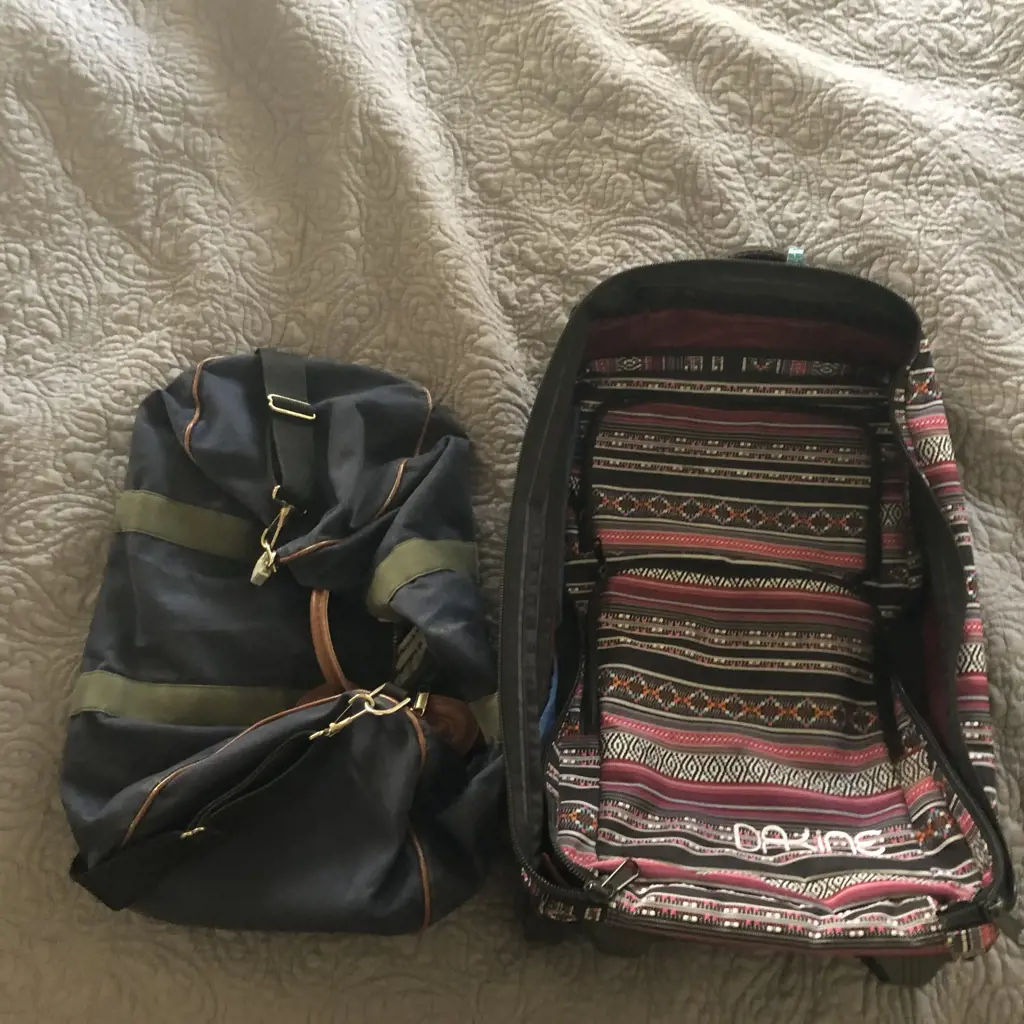
Writing can be a therapeutic and fulfilling activity, whether you're jotting down your thoughts in a personal journal or embarking on a creative writing project. To make the most of your writing experience, it's important to have the right tools and supplies at your disposal.
Here are the essential writing tools and supplies you should consider bringing:
- Pen and Paper: While it may seem obvious, having a reliable pen and a stack of blank paper is crucial. A smooth-flowing pen will allow you to seamlessly transfer your thoughts onto paper. Consider investing in a good-quality pen that suits your writing style. Additionally, opt for acid-free paper to prevent yellowing and preserve your writing for years to come.
- Laptop or Tablet: If you prefer typing over writing by hand, a laptop or tablet is a must-have. These devices enable you to effortlessly edit and delete text, making the writing process more efficient. Furthermore, they provide access to various writing software and tools that can enhance your productivity, such as word processors and grammar-checking programs.
- Writing Software: There is a plethora of writing software available today specifically designed to cater to different writing needs. Some popular options include Microsoft Word, Google Docs, Scrivener, and Evernote. These programs offer features like automatic spelling and grammar correction, organization templates, and cloud storage for easy access to your work.
- Thesaurus and Dictionary: To add depth and richness to your writing, a thesaurus and dictionary are invaluable resources. A thesaurus provides synonyms and antonyms, helping you to avoid repetitive language and find the perfect word to express your ideas. Similarly, a dictionary ensures accurate and effective communication by providing definitions and clarifications.
- Reference Materials: Depending on the type of writing you're engaged in, having reference materials on hand is essential. For non-fiction or research-heavy writing, consider bringing books, articles, or websites that contain reliable and relevant information. These materials will serve as valuable sources for fact-checking and gathering supporting evidence.
- Note-taking App or Notebook: Inspiration can strike at any moment, so it's important to capture your ideas quickly. Utilizing a note-taking app on your phone or carrying a small notebook allows you to jot down thoughts, observations, or snippets of dialogue on the go. These little sparks of creativity can later serve as building blocks for your writing.
- Comfortable Workspace: Creating a comfortable and conducive writing environment is crucial for staying productive and focused. If possible, set up a designated writing space at home with a comfortable chair, good lighting, and minimal distractions. Additionally, consider investing in ergonomic accessories such as a keyboard wrist rest or an adjustable desk if you spend long hours writing.
In conclusion, having the right tools and supplies is essential for an enjoyable and efficient writing experience. Whether you prefer writing by hand or using digital tools, make sure to equip yourself with high-quality pens, paper, laptops, tablets, and writing software. Other resources such as dictionaries, thesauruses, reference materials, note-taking apps or notebooks, and a comfortable workspace should also be considered. By arming yourself with the appropriate tools, you'll be well-prepared to embark on your writing journey.
Essential Items to Pack for Hiking in the Grand Canyon
You may want to see also

Should I bring snacks or other food items for the duration of the retreat?
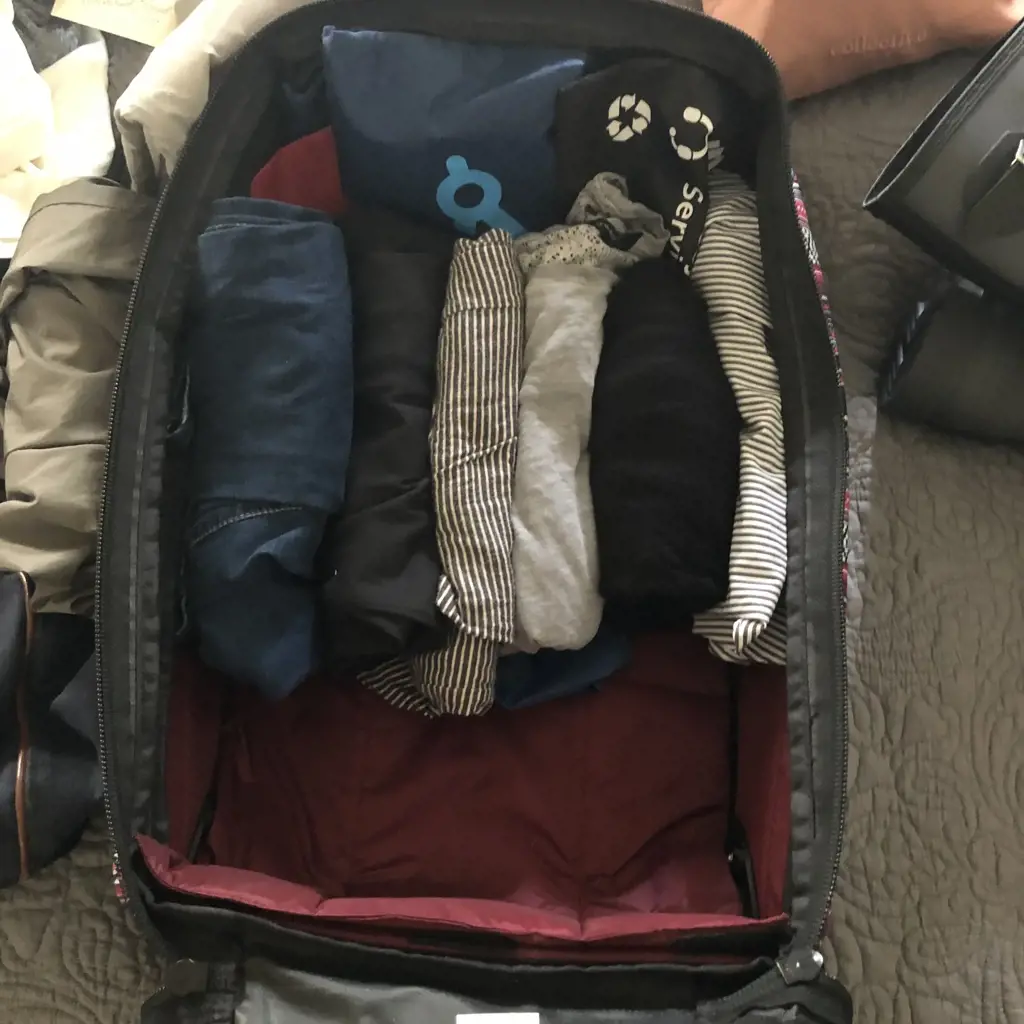
When planning for a retreat, there are many things to consider, including what to bring in terms of food and snacks. Whether you are attending a personal or professional retreat, it's important to plan ahead and prepare for your dietary needs during the retreat. Here are some factors to consider when deciding whether or not to bring snacks or other food items for the duration of the retreat.
Duration of the retreat:
The first factor to consider is the duration of the retreat. If it is a short retreat that lasts only a day or two, you may not need to bring snacks or other food items. However, if the retreat lasts for several days or a week, it's important to bring some food items to sustain you throughout the duration of the retreat.
Dietary restrictions or preferences:
If you have specific dietary restrictions or preferences, it's crucial to bring snacks or other food items that cater to your needs. Many retreat centers or venues may not be able to accommodate all dietary needs, so bringing your own food ensures that you have something to eat that aligns with your dietary restrictions or preferences.
Availability of on-site food options:
Before deciding whether to bring snacks or other food items, find out if there are on-site food options available at the retreat venue. Some retreat centers may offer meals or have a dining area where you can purchase food during your stay. In this case, you may not need to bring your own snacks or food items.
Energy and focus:
Retreats often involve intense mental, emotional, or physical activities that require energy and focus. Having snacks or food items readily available can help replenish your energy levels and keep you focused throughout the retreat. Healthy snacks like nuts, fruits, and granola bars can provide a quick energy boost when needed.
Convenience and comfort:
Bringing your own snacks or food items can add convenience and comfort to your retreat experience. You won't have to worry about going hungry or searching for suitable food options during break times or free periods. Having familiar and favorite snacks can also help you feel more comfortable and at ease during the retreat.
Examples:
Jane is attending a week-long meditation retreat that takes place in a secluded area with limited access to food options. She follows a vegan diet and has specific food allergies. Knowing that the retreat center may not be able to accommodate her dietary needs, Jane decides to bring her own snacks and food items for the duration of the retreat. She packs a variety of vegan protein bars, dried fruits, and nuts to ensure she has enough sustenance to get through the retreat.
On the other hand, John is attending a two-day team-building retreat at a retreat center that offers catered meals. He doesn't have any special dietary restrictions and is confident that the retreat center can provide suitable food options. Therefore, John decides not to bring any snacks or food items and plans to rely on the meals provided at the retreat center.
In conclusion, whether or not to bring snacks or other food items for the duration of a retreat depends on various factors such as the retreat's duration, dietary restrictions or preferences, availability of on-site food options, energy and focus requirements, and personal convenience and comfort. Considering these factors will help you make an informed decision about bringing your own snacks or relying on the food options available at the retreat venue.
Essential Items to Pack for Your Allure of the Seas Cruise
You may want to see also

Are there any recommended books or reading materials to bring along for inspiration during a writing retreat?
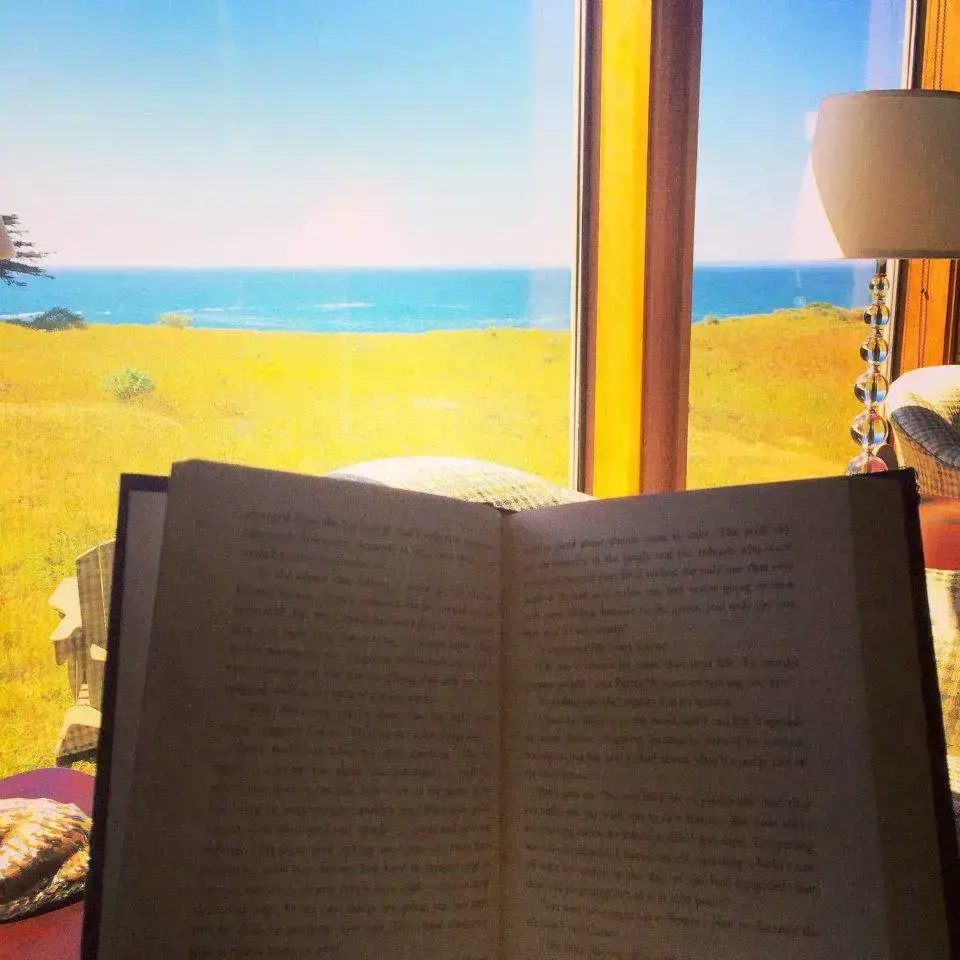
A writing retreat can be a great way to focus on your writing and gather inspiration to kick-start your creative process. Bringing along some recommended books or reading materials can enhance your experience and provide you with additional insights and motivation. Here, we explore several options that you may consider to make the most out of your writing retreat:
Literary Classics:
Bringing along some literary classics can help you appreciate the art of writing and provide inspiration for your own work. Books like "To Kill a Mockingbird" by Harper Lee, "Pride and Prejudice" by Jane Austen, or "Moby-Dick" by Herman Melville can introduce you to beautiful prose, well-developed characters, and intricate plotlines. Reading these timeless works can stimulate your creativity and give you a sense of what is possible in storytelling.
Writing Craft Books:
There are numerous books available that explore the craft of writing and offer practical advice for aspiring authors. Books like "On Writing: A Memoir of the Craft" by Stephen King, "Bird by Bird" by Anne Lamott, or "The Elements of Style" by William Strunk Jr. and E.B. White can provide guidance on various aspects of writing, such as character development, plot structure, and style. These books can be used as reference materials during your retreat, helping you polish your skills and refine your writing process.
Genre-Specific Books:
If you are working on a specific genre, it can be helpful to bring along books within that genre for inspiration. For example, if you are writing a mystery novel, reading classics like Agatha Christie's "Murder on the Orient Express" or contemporary bestsellers like Gillian Flynn's "Gone Girl" can give you insights into the conventions and techniques of the genre. By studying successful works within your chosen genre, you can better understand the expectations of readers and find your unique voice within that space.
Memoirs and Biographies:
Memoirs and biographies can provide glimpses into the lives and experiences of other writers, offering valuable insights into their creative processes and the challenges they faced. Books like "On Writing: A Memoir of the Craft" by Stephen King or "The Diary of a Young Girl" by Anne Frank can be particularly inspiring, as they delve into personal struggles and triumphs. Reading about the lives of successful writers can remind you that the creative journey is not always easy but can ultimately lead to great rewards.
Travelogues and Nature Writing:
If your retreat takes place in a picturesque location or natural setting, consider bringing along travelogues or nature writing books. These can help you immerse yourself in the surroundings and evoke a strong sense of place in your own writing. Books like "A Year in Provence" by Peter Mayle or "Walden" by Henry David Thoreau can inspire you to observe and appreciate the world around you, bringing a vividness and depth to your own descriptions.
Bringing a variety of books to your writing retreat can keep you motivated, provide inspiration, and offer valuable insights into the craft of writing. Ultimately, the books you choose should resonate with your personal interests and writing goals, helping you make the most of your retreat experience.
The Essential Packing Guide for a Trip to Hawaii
You may want to see also
Frequently asked questions
Packing for a writing retreat involves considering your writing needs and the environment you'll be in. Some essentials to pack include your laptop or notebook, pens and pencils, and a comfortable writing chair.
It can be helpful to bring multiple notebooks to a writing retreat, especially if you like to organize your thoughts or work on different projects simultaneously. This way, you can keep your ideas separate and easily refer back to them.
While many writing retreats provide meals and refreshments, it's always a good idea to bring your favorite snacks and beverages. This ensures you have something you enjoy and that can provide a quick energy boost during long writing sessions.
Comfort is key when selecting clothing for a writing retreat. Opt for loose-fitting, breathable clothes that allow you to move comfortably. Also, pack a few layers as the temperature might vary throughout the day.
Consider packing items that inspire you or help stimulate your creativity. This might include books in your favorite genre, a journal for jotting down random thoughts or observations, or even photos or objects that hold personal significance.
Remember, it's important to pack what you feel will be most conducive to your writing process and personal comfort.





